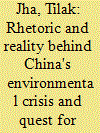| Srl | Item |
| 1 |
ID:
129683


|
|
|
|
|
| Publication |
2014.
|
| Summary/Abstract |
An annual survey quoted by China Daily on 24 January 2014 said that more than 30 percent of young Chinese counted environment as a factor while choosing their study destination- up nearly 10 percent than a year ago. That could be symbolic of environmental awareness or panic, or simply helplessness at the state of environment in China. However, China need to grow fast requires it to produce cheap coal energy the primary reason causing all sorts of environmental problem by polluting air- in constantly growing amount. Thus, even as China emerge as a top renewable energy investor and producer while ramping up the efforts to lessen dependence on coal, the quest to ensure reliable energy security is not going to be easy. These constraints agencies seem to have even the Chinese government's genuine effort regarding environment being doubted.
|
|
|
|
|
|
|
|
|
|
|
|
|
|
|
|
| 2 |
ID:
052030


|
|
|
|
|
| Publication |
March 2004.
|
| Summary/Abstract |
This article has three objectives: 1) to assess the contribution of villager self-government to the development of community councils in urban China; 2) to discuss whether there are lessons to be learned from the experiments in urban community councils relevant to the building of rural communities; and 3) most importantly, to raise theoretical issues common to both villager self-government and urban community councils. In fulfilling these three aims, this article will further understanding of the expansion of grassroots democracy and increasing citizens' participation in China.
The article's comparative approach will incorporate an analysis of the institutionalization of the 'Four Democracies' at the village level and the extent to which they are also being implemented in the different and varying circumstances of the urban experiments and environments. We are interested in whether the villagers' committees and residents' committees, especially the latter in their restyled community status, are training grounds for citizenship. The different human landscapes of village and community, however, will have a profound effect on the nature and exercise of citizenship.
|
|
|
|
|
|
|
|
|
|
|
|
|
|
|
|